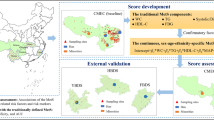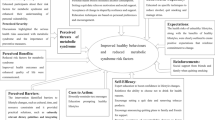Abstract
The cluster of metabolic and hemodynamic risk factors known as metabolic syndrome is known to be a risk factor for ischemic cardiovascular diseases and stroke. By analyzing the cross-sectional data from 8,144 individuals (age 19−88 years) who underwent general health screening, we have investigated the prevalence of metabolic syndrome, as diagnosed by modified-National Cholesterol Education Program (NCEP) criteria corresponding to the following five categories: triglycerides ≥150 mg/dl; high density lipoprotein (HDL)-cholesterol <40 mg/dl in men or <50 mg/dl in women; fasting plasma glucose ≥110 mg/dl; systolic/diastolic blood pressure ≥130/85 mmHg; and body mass index >25 kg/m2. We found that the prevalence of metabolic syndrome was 19% in men and 7% in women. After adjustment for age, metabolic syndrome was found to be significantly more prevalent in men than in women, with an odds ratio of 3.08 (95% confidence interval [CI] 2.62−3.61, p<0.0001). Among the five metabolic/hemodynamic risk factor components, hypertension was observed most frequently in individuals with metabolic syndrome, at 85% in men and 87% in women. In addition, multivariate logistic regression analysis adjusted for age, sex, serum total cholesterol levels, and smoking status showed that hypertension possessed the greatest odds ratio (1.43, 95% CI 1.27−1.60) for carotid plaque among the metabolic/hemodynamic risk factors. These data emphasize the importance of controlling blood pressure for reducing the risk of both metabolic syndrome and carotid arteriosclerosis in apparently healthy individuals.
Similar content being viewed by others
Article PDF
References
Executive summary of the third report of the National Cholesterol Education Program (NCEP) Expert Panel on Detection, Evaluation, and Treatment of High Blood Cholesterol in Adults (Adult Treatment Panel III). JAMA 2001; 285: 2486– 2497.
Florkowski CM : Management of co-existing diabetes mellitus and dyslipidemia: defining the role of thiazolidinediones. Am J Cardiovasc Drugs 2002; 2: 15– 21.
Dobrian AD, Schriver SD, Khraibi AA, Prewitt RL : Pioglitazone prevents hypertension and reduces oxidative stress in diet-induced obesity. Hypertension 2004; 43: 48– 56.
Gilling L, Suwattee P, DeSouza C, Asnani S, Fonseca V : Effects of the thiazolidinediones on cardiovascular risk factors. Am J Cardiovasc Drugs 2002; 2: 149– 156.
Meigs JB : Epidemiology of the metabolic syndrome, 2002. Am J Manag Care 2002; 8: S283– S292; quiz S293-S296.
Sattar N, Gaw A, Scherbakova O, et al : Metabolic syndrome with and without C-reactive protein as a predictor of coronary heart disease and diabetes in the West of Scotland Coronary Prevention Study. Circulation 2003; 108: 414– 419.
Ninomiya JK, L'Italien G, Criqui MH, Whyte JL, Gamst A, Chen RS : Association of the metabolic syndrome with history of myocardial infarction and stroke in the third national health and nutrition examination survey. Circulation 2004; 109: 42– 46.
Wong ND, Sciammarella MG, Polk D, et al : The metabolic syndrome, diabetes, and subclinical atherosclerosis assessed by coronary calcium. J Am Coll Cardiol 2003; 41: 1547– 1553.
Sone H, Ito H, Ohashi Y, Akanuma Y, Yamada N : Obesity and type 2 diabetes in Japanese patients. Lancet 2003; 361: 85.
Matthews DR, Hosker JP, Rudenski AS, Naylor BA, Treacher DF, Turner RC : Homeostasis model assessment: insulin resistance and beta-cell function from fasting plasma glucose and insulin concentrations in man. Diabetologia 1985; 28: 412– 419.
Rutter MK, Parise H, Benjamin EJ, et al : Impact of glucose intolerance and insulin resistance on cardiac structure and function: sex-related differences in the Framingham Heart Study. Circulation 2003; 107: 448– 454.
Ishizaka N, Ishizaka Y, Takahashi E, et al : Association between insulin resistance and carotid arteriosclerosis in subjects with normal fasting glucose and normal glucose tolerance. Arterioscler Thromb Vasc Biol 2003; 23: 295– 301.
Guidelines Subcommittee : 1999 World Health Organization-International Society of Hypertension Guidelines for the Management of Hypertension. J Hypertens 1999; 17: 151– 183.
Japanese Society of Hypertension Guidlines Subcommittee for the Management of Hypertension : Guidelines for the management of hypertension for general practitioners. Hypertens Res 2001; 24: 613– 634.
Meigs JB, Wilson PW, Nathan DM, D'Agostino RB Sr, Williams K, Haffner SM : Prevalence and characteristics of the metabolic syndrome in the San Antonio Heart and Framingham Offspring Studies. Diabetes 2003; 52: 2160– 2167.
Hu G, Qiao Q, Tuomilehto J, Balkau B, Borch-Johnsen K, Pyorala K : Prevalence of the metabolic syndrome and its relation to all-cause and cardiovascular mortality in nondiabetic European men and women. Arch Intern Med 2004; 164: 1066– 1076.
Lee WY, Park JS, Noh SY, Rhee EJ, Kim SW, Zimmet PZ : Prevalence of the metabolic syndrome among 40,698 Korean metropolitan subjects. Diabetes Res Clin Pract 2004; 65: 143– 149.
Lawlor DA, Ebrahim S, Davey Smith G : The metabolic syndrome and coronary heart disease in older women: findings from the British Women's Heart and Health Study. Diabet Med 2004; 21: 906– 913.
Bonora E, Kiechl S, Willeit J, et al : Metabolic syndrome: epidemiology and more extensive phenotypic description. Cross-sectional data from the Bruneck Study. Int J Obes Relat Metab Disord 2003; 27: 1283– 1289.
Yamamoto A, Temba H, Horibe H, et al : Life style and cardiovascular risk factors in the Japanese population from an epidemiological survey on serum lipid levels in Japan 1990 Part 2: association of lipid parameters with hypertension. J Atheroscler Thromb 2003; 10: 176– 185.
Tatsukawa M, Sawayama Y, Maeda N, et al : Carotid atherosclerosis and cardiovascular risk factors: a comparison of residents of a rural area of Okinawa with residents of a typical suburban area of Fukuoka, Japan. Atherosclerosis 2004; 172: 337– 343.
Bonora E, Kiechl S, Willeit J, et al : Carotid atherosclerosis and coronary heart disease in the metabolic syndrome: prospective data from the Bruneck study. Diabetes Care 2003; 26: 1251– 1257.
Scuteri A, Najjar SS, Muller DC, et al : Metabolic syndrome amplifies the age-associated increases in vascular thickness and stiffness. J Am Coll Cardiol 2004; 43: 1388– 1395.
Tozawa M, Iseki K, Iseki C, et al : Impact of multiple risk factor clustering on the elevation of blood pressure. Hypertens Res 2002; 25: 811– 816.
Honda O, Sugiyama S, Kugiyama K, et al : Echolucent carotid plaques predict future coronary events in patients with coronary artery disease. J Am Coll Cardiol 2004; 43: 1177– 1184.
Takiuchi S, Rakugi H, Fujii H, et al : Carotid intima-media thickness is correlated with impairment of coronary flow reserve in hypertensive patients without coronary artery disease. Hypertens Res 2003; 26: 945– 951.
Author information
Authors and Affiliations
Corresponding author
Rights and permissions
About this article
Cite this article
Ishizaka, N., Ishizaka, Y., Toda, EI. et al. Hypertension Is the Most Common Component of Metabolic Syndrome and the Greatest Contributor to Carotid Arteriosclerosis in Apparently Healthy Japanese Individuals. Hypertens Res 28, 27–34 (2005). https://doi.org/10.1291/hypres.28.27
Received:
Accepted:
Issue date:
DOI: https://doi.org/10.1291/hypres.28.27
Keywords
This article is cited by
-
Association between the intima-media thickness of the extracranial carotid arteries and metabolic syndrome in ethnic Kyrgyzs
BMC Cardiovascular Disorders (2018)
-
Effect of metabolic syndrome components and their clustering on carotid atherosclerosis in a sample of the general Japanese population
Hypertension Research (2016)
-
Five-year change in systolic blood pressure is independently associated with carotid atherosclerosis progression: a population-based cohort study
Hypertension Research (2014)
-
Comprehensive assessment of metabolic syndrome among rural Bangladeshi women
BMC Public Health (2012)
-
Hypertension among Tunisian adults: results of the TAHINA project
Hypertension Research (2012)



